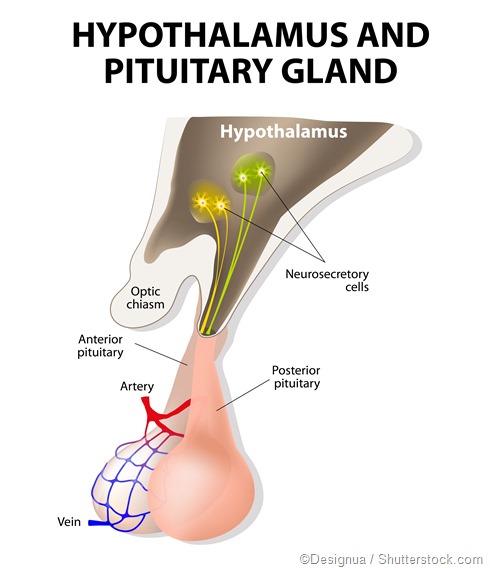Phantom pregnancy or pseudocyesis is a rare condition nowadays, affecting only about 6 in 22 000 pregnant women in the US. However, its incidence may be higher in communities which put a higher priority on fertility in women.
Phantom pregnancy is different from a delusion of pregnancy. The latter occurs in mentally unstable women, as part of their psychotic symptoms. The fixed false belief that the woman is pregnant remains despite all reasoning and evidence to the latter. There are no physical changes similar to those that occur in a pregnant woman either.
It is supposed that the hypothalamus is involved in the neuroendocrine processes that give rise to this condition. This may lead to alterations in various hormones which regulate the working of the reproductive organs, and result in an ovulatory cycle, hypertrophy of the corpus luteum, as well increased responsiveness to the hormones. Basal levels of both prolactin and luteinizing hormone are normal or raised, while the pulsatile nature of their secretion becomes exaggerated.

Risk factors
Women who are at higher risk for a phantom pregnancy are those who have suffered intense distress or loss regarding pregnancy experiences. For example:
- Women who have been trying to conceive for a long time without success and are coming to the end of their reproductive life
- Women whose emotions run extremely deep with respect to pregnancy, or who have a great longing to become pregnant, though they are otherwise well balanced emotionally (or are non-psychotic)
- Women who have lost a fetus or a child
- Women who have lost a lover
- Women who very much fear becoming pregnant
- Women on drugs which increase the prolactin levels may experience galactorrhea, which may give rise to the illusion of pregnancy
- Women of a lower socioeconomic status are more prone to develop the condition; this is more pronounced when they experience powerlessness and deep insecurity in the face of a relationship that is about to end against their will, or following a loss
Main causes of phantom pregnancy
The root of phantom pregnancy is thought to be an interaction between the reproductive system and the mind, postulated to be mediated by hormonal aberrations. This is interlinked with three factors which may cause feelings of false pregnancy.
First one of them is intense craving for or fear of pregnancy, which may operate in the following situations:
- Infertility
- A woman entering into a second marriages or marriage with a previously married man
- Repeated abortions
- Following operations on the reproductive organs
- When the woman wants to pressure a man into marriage
Then there are vague sensations which may be interpreted as signs of pregnancy, such as nausea, abdominal swelling, or feelings of pelvic pressure. This initial misperception may lead to a phantom pregnancy via the release of nervous system chemicals and certain hormones such as prolactin or luteinizing hormone. Some situations which are liable to produce phantom pregnancy include:
- Pelvic tumors
- Abdominal tumors
- Aging processes such as perimenopausal symptoms
- Galactorrhea due to hormone-secreting pituitary tumors known as prolactinomas
- Symptoms of pregnancy due to elevated levels of beta-HCG (human chorionic gonadotropin), also known as the pregnancy hormone, as a part of paraneoplastic phenomena in bronchogenic carcinoma
- Bloating of the body, sometimes due to various medications such as oral contraceptives

There is also a big role of depression, which is a frequently associated phenomenon, but often neglected when considering this specific disorder. Other factors may also include:
- Emotional distress
- Sexual abuse in childhood
- Breakups or distress during love relationships
Further Reading
Last Updated: Feb 27, 2019